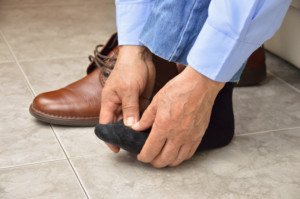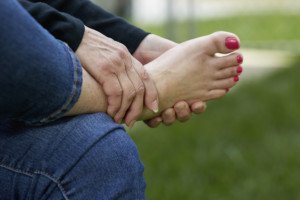
If the twitching in the bottom of your foot is driving you mad, this article is a must-read.
Twitching in the bottom of the foot may at first seem innocent enough, and at the most, just a nuisance.
It may be most prominent while you are seated in a relaxed position, or reclined in a comfortable chair.
The problem with twitching in the bottom of your foot occurs when you decide to search the Internet about this, and are led astray by ALS sites or even multiple sclerosis sites.
Though you learn that muscle twitching (called fasciculations) can have quite a few benign causes, for some reason you zero in on what’s actually the least likely cause: ALS.
You zero in on this because it’s also the deadliest cause. This is how the mind can work.
YOU ARE NOT ALONE.
I was once reading a forum thread regarding the issue of fasciculations.
This phenomenon is often referred to as benign fasciculation syndrome when it becomes frequent and annoying enough.
People with benign fasciculation syndrome may spend too much time perusing the ALS sites and even reading the forums on these sites, going as far as registering and getting involved to collect more information.
Every time they have a fasciculation, the fear ALS. In that forum I had once read, somebody summed it up beautifully: “This thing really messes with your head.”
So what can be causing the twitching in the bottom of your foot?

Shutterstock/Pamela Au
“There are many causes for muscle twitching, most of which are benign,” explains neurologist Dr. Mary Dombovy, a neurologist with Rochester Regional Health in New York.
Dr. Dombovy continues, “Most people will have at least some episodes of muscle twitching during their life and if it is isolated to one area and not associated with other symptoms and goes away in a few hours or days, you don’t need to see a doctor.
“Some common causes of muscle twitching include exercise, particularly prolonged exertion, electrolyte abnormalities, muscle or nerve injury, muscle or nerve disease (most of which is not ALS).”
Massage the bottom of your foot if it continues to twitch, and curl the toes in and release them, alternating this way, to give the foot some exercise.
Drink plenty of water, as dehydration can also be causing the fasciculations.

Freepik.com
Anxiety can aggravate this symptom. Try to relax, meditate, strike some yoga poses, relax in a hot tub, listen to some soothing music – anything to calm your nerves and restore some positive thinking.
Like that one forum participant said, an obsession with fasciculations can really mess with your head.

Dr. Dombovy completed her neurology residency at Mayo Graduate School of Medicine.
 Lorra Garrick has been covering medical, fitness and cybersecurity topics for many years, having written thousands of articles for print magazines and websites, including as a ghostwriter. She’s also a former ACE-certified personal trainer.
Lorra Garrick has been covering medical, fitness and cybersecurity topics for many years, having written thousands of articles for print magazines and websites, including as a ghostwriter. She’s also a former ACE-certified personal trainer.
.
Top image: Shutterstock/cunaplus











